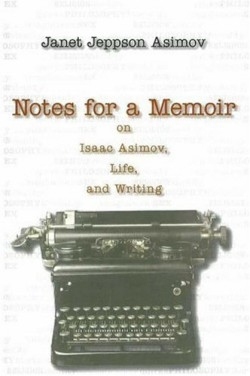Notes for a Memoir
On Isaac Asimov Life and Writing
Albert Einstein once remarked that “imagination is more important than knowledge,” and for this author, imagination is even more important than that: she believes it is the root of identity. Asimov (wife of famed writer Isaac Asimov) weaves the importance of the human imagination throughout her discussions of her husband, her life, and what she calls the “compulsion to write,” in this memoir, which she describes as a “series of notes.”
Asimov has written more than twenty books and is also a psychiatrist and psychoanalyst, and it is perhaps because of her psychological training that she opts not to tell a chronological tale in her memoir. Organized by chapters on topics such as “religion,” “sex,” and “identity,” this volume disrupts the traditional narrative by adhering to ideas rather than sequential storytelling. At some points, her seemingly independent essays intersect and entwine themselves amongst one another, but for the most part, she works to keep her notes about each aspect of her story separate.
The author intersperses her anecdotes with letters from Isaac and other friends and family members, portraying the unique relationship she shared with her husband. The excerpted material demonstrates a mutual love of imagination, science, and writing—themes that repeat themselves throughout the book. Asimov reveals, underneath their seemingly fanciful life together, the touching reality of being human—its sorrows as well as its joys. She quotes from one of Isaac’s letters: “I would rather weep a thousand times than to live a life having never had anything worth weeping the loss of.”
The letters, speeches, and personal conversations help to further illuminate the couple’s relationship, but at times the “notes” become disjointed and somewhat distracting. Also, because the author avoids what she deems “verbal diarrhea,” she refuses to discuss much of her husband’s death and her subsequent depression. Unfortunately, this only serves to distance the writer from her readers instead of drawing them closer.
In the end, though, this is an intriguing and insightful book. Fans of both the author’s work and her husband’s will appreciate the opportunity to delve into this memoir’s humor and passion. The book works to engage readers not just in a series of stories, but ultimately in a journey, and one does feel a sense of having traveled through time, through imagination, and through meaning after reading this book. As Asimov comments about journeys, “Whether or not they are happy is up to luck and the traveler and imagination.”
Reviewed by
Jessica Higgins
Disclosure: This article is not an endorsement, but a review. The publisher of this book provided free copies of the book to have their book reviewed by a professional reviewer. No fee was paid by the publisher for this review. Foreword Reviews only recommends books that we love. Foreword Magazine, Inc. is disclosing this in accordance with the Federal Trade Commission’s 16 CFR, Part 255.

